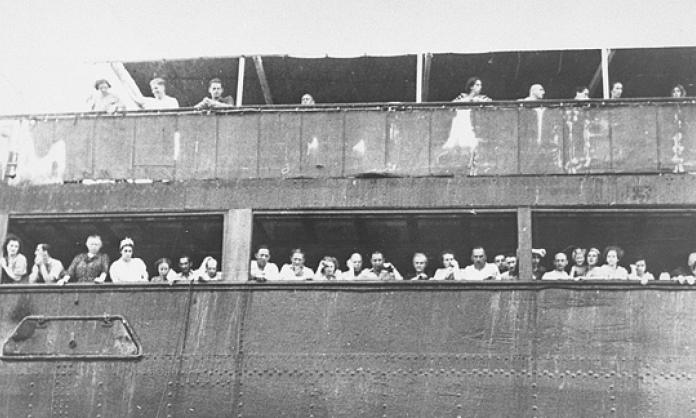The Western powers lack of interest in refugees from totalitarian regimes is not new.
The period after Hitler came to power in 1933 was marked by increasingly virulent attacks on Jews. In 1938, US president Franklin Roosevelt initiated a conference at Evian-les-Bains, France, supposedly to help Jewish refugees.
At that time about 450,000 Jews out of a total of 950,000 had left Germany. But the conference did nothing. The US delegates offered no place to settle Jews fleeing Hitler and passed the buck to South American states. One by one, the South Americans said no.
The Australian representative disingenuously said: “[A]s we have no real racial problem, we are not desirous of importing one”. This was in spite of the ongoing genocide against Aborigines and the White Australia policy.
Roosevelt had ambivalent attitudes toward Jews. Although he had some Jews in his administration, he never made the slightest move in the 1930s to amend the then anti-Semitic immigration laws.
Later, at the January 1943 Casablanca Conference, he referred to what he called the specific and understandable complaints that the Germans made about Jews because of their disproportionate representation in the professions.
The outbreak of war did not change the attitude of the imperialist powers. Information about the systematic killing of Jews was smuggled out via various routes from 1941, but was almost universally disbelieved, ignored or suppressed.
When Jan Karski, a brave Polish resistance fighter, escaped to the West, he brought detailed information about the situation under the Nazi occupation, including the Holocaust. Karski met political leaders, including the UK foreign secretary Anthony Eden and president Roosevelt. None of them took him seriously. Roosevelt reportedly asked about the condition of horses in Poland but did not ask a single question about Jews. Karski concluded that the Jews “were abandoned by all world governments”.
Beginning around March 1943, there were calls for the Allies to bomb the rail lines leading to the Auschwitz death camp. US military chiefs refused, arguing that this would divert resources from the war effort and that the rails were hard to hit.
Undersecretary of war John J. McCloy fretted that such bombings might “provoke more vindictive actions by the Germans” – as if there were any worse fate than the death camps. The tone of Allied refugee policy was set by the US, but Britain followed closely behind, “putting self-interest first”.
Overall, the Western governments displayed a shocking indifference to the fate of the Jews. Many historians have attested to this. US historian Walter Laqueur concludes that, despite knowing about the “final solution” from an early date, the US, the UK and the Soviet Union showed no interest in the fate of the Jews. He argues that not only was no action taken but the information was actively suppressed.
US intelligence, for example, took an interest in the movements of forced labour teams because they were a factor in the German war effort. But according to Holocaust historian Richard Breitman, author of US Intelligence and the Nazis, the CIA’s predecessor organisation, the Office of Strategic Services, “does not seem to have taken much detailed interest in German camps as they concerned the extermination of Jews”.
Michael Neufeld, introducing a collection of essays on prospects for bombing Auschwitz, concludes: “The Holocaust simply was not an important issue on the public or military agenda of World War II”.
Neither the imperialist powers before the war nor the Allies and the official war effort were ever interested in helping Jews.





